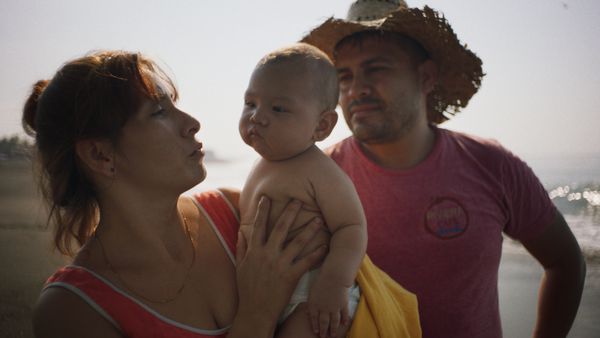Eye For Film >> Movies >> Sansón And Me (2022) Film Review
Sansón And Me
Reviewed by: Amber Wilkinson

After films including Lupe In The Sun and Abuelos, Mexican-American documentarian Rodrigo Reyes continues his examination of the experience of Mexican emigres and their families both in their home and adopted lands with his latest film, which is structured around his correspondence and conversations with Sansón Noe Andrade, a Mexican migrant sentenced to life without parole in the US for his part in a killing.
Reyes met Andrade when he was his court-appointed interpreter and, drawn to him by their shared emigre status, invited him to be part of a film that considers his life. The end result is a ruminative if sometimes unwieldy examination not just of the childhood and life that led Sansón to be incarcerated but, by extension, a consideration of Mexican socioeconomics and the American justice system. Since Reyes is unable to record Andrade directly, he enlists members of the young man's family back in Mexico to re-enact scenes from his life in the film, which won the Best International Feature award at Sheffield DocFest.
The documentarian is unusually open about the process, not only showing the 'casting' of the film, which involves Andrade's nephew Tonito standing in for him in his younger years, and his uncle doubling for his alcoholic father, but also indicating the director's own immersion in the family, as he discovers Andrade's sister Débora is struggling with drug issues. Reyes also doesn't shy away from drawing parallels between his life and Andrade's, also articulating his own joys and grief. There’s an inherent sadness to this, not least because this film is taking a much more sobering sweep than more frequently made films about jail time, which tend to end with exoneration or freedom, which Reyes notes from the start is not within this documentary’s gift.
In between re-enactments, which highlight the way that families can become trapped in a cycle of addiction and incarceration, we hear Andrade talking not only about daily life in jail. He outlines, among other things, how they make a version of tamales out of Doritos and illicit hooch, but also offers more philosophical considerations of his life, most poignantly that prison is, ironically, the most stable place he has ever lived. If there is a gap in Reyes’ film, it’s the lack of involvement of Andrade’s girlfriend and the mother of his child, although it’s fair to say things have probably become very complicated, given his brother-in-law’s part in the crime that saw him locked up. There is a sense of loss that permeates the film – not just the loss of homeland and family in the past, or Andrade’s loss of freedom in the present but the loss of a future bringing up his son. This is enhanced by the gently lilting score from Jacobo Lieberman that also includes some of Andrade’s thoughts turned into a melancholy cancion about the Devil and his temptations.
Reviewed on: 29 Jun 2022
















